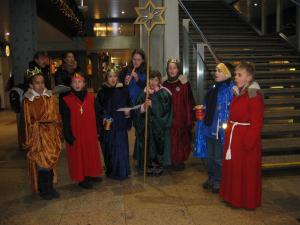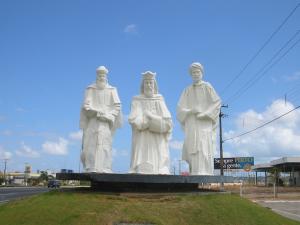 “We three kings of Orient are, bearing gifts we travel afar…” You of course know the rest of this most famous of Epiphany hymns. I know we have been singing it and hearing it for the past month, in mall and church, but it is only really appropriate for this Sunday, the day of the appearance of the Messiah, his epiphany to the whole world in the persons of the Magi from the east, all according only to the Gospel of Matthew. I hope I do not burst your romantic bubble, but this whole bit is surely a myth, conjured from various biblical passages and the need to make the event of Jesus’s birth a world- changing one. Please remember the definition of that scary word “myth”: history is an event that occurs once, while myth is a story for all time. Here is a story that remains vibrant two millennia after its first telling.
“We three kings of Orient are, bearing gifts we travel afar…” You of course know the rest of this most famous of Epiphany hymns. I know we have been singing it and hearing it for the past month, in mall and church, but it is only really appropriate for this Sunday, the day of the appearance of the Messiah, his epiphany to the whole world in the persons of the Magi from the east, all according only to the Gospel of Matthew. I hope I do not burst your romantic bubble, but this whole bit is surely a myth, conjured from various biblical passages and the need to make the event of Jesus’s birth a world- changing one. Please remember the definition of that scary word “myth”: history is an event that occurs once, while myth is a story for all time. Here is a story that remains vibrant two millennia after its first telling.
Just why and how did this myth grow into a crucial part of the powerful tale of the birth of Jesus? Simply put, it was crucial that the birth of Jesus be witnessed by the widest possible cadre of first-century people. Luke, given his central interest in the poor and marginalized of his day, focused attention on the shepherds as the first witnesses to the birth. Shepherds in first-century Palestine were not among the most trustworthy of groups, as any number of secular documents of the time make clear. Rather than being lauded for their important work with those animals that lay at the heart of the economies of the period, they were more often looked at askance as foul-smelling, hard-drinking folk whose appearance caused more than a few to put their hands over their wallets, or the first-century equivalents of bags where the coin was kept. For Luke to name shepherds as those who first were given news of the Messiah’s birth, and who became therefore the first evangelists, rushing away from the birth place, “praising God and saying, ‘Glory to God in the highest and on earth peace among those God favors,’” was little short of a scandal.
Matthew appears to have a rather different audience in mind for his gospel. First, he is concerned that his Jewish friends see clearly that Jesus’s coming fulfills their own ancient scriptures, as he quotes those texts again and again. Second, he paints his story of Jesus against the backdrop of world events, demonstrating that Jesus is a direct descendant of the great David, king of Israel, and that an orderly movement of God- directed history brings the certainty of Jesus’s birth at just this time and in just this place. Thus, it is crucial for Matthew that mysterious and powerful leaders from foreign lands not only discern that the Messiah of God has been born in Bethlehem of Judea, but that representatives of those non-Israelites must publically, and at considerable risk to themselves, come to the birthplace and “give him homage.” As a result, the Magi from somewhere in the east travel afar and trick the wily King Herod concerning the place of the birth, being sure to mislead his henchmen who search for the child to murder him as a potential rival for the throne.
A careful glance at the hymn I mentioned above will indicate some obvious ways that the myth took on its current shape. We all have been led to believe that the kings are three in number, though no specific number is provided by Matthew. Indeed, in early iconography of the scene, any number of Magi are suggested, as many as twelve in one painting. Of course, they are thought to be three in number because they bring three gifts, the famous gold, frankincense, and myrrh. The first two gifts come from Is.60:6, from the Hebrew Bible text from today’s lectionary. Matthew apparently adds myrrh as the third gift of the Magi. Myrrh was a well known commodity traded in the Near East from ancient times (see, for example, the reference at Gen.37:25 where Ishmaelite traders are said to be carrying myrrh as they seek markets among the brothers of Joseph). Myrrh is said to be an aromatic spice that was hung between the breasts of oriental women (Song of Songs 1:13). Each of the three gifts of the Magi was well known as an expensive and sought after commodity. Three gifts created three Magi, though only two of the gifts are mentioned at Is.60:6.
But note how the Magi have now become kings in the hymn. This is almost certainly the result of still another line from Is.60. At Is.60:3, the oracle announces that in the light of God’s glory, “nations will come to your light, and kings to the brightness of your dawn.” Then, too, exactly who can afford the rich gifts presented to the Christ child? The obvious answer is kings. The monarch is the one who has fullest access to wealth in the ancient world, so Magi, wise men (astrologers?) turn into kings. It might be noted here that in the ubiquitous short opera of Giancarlo Menotti, “Amahl and the Night Visitors,” the three kings, named Caspar, Melchior, and Balthazar, combine both royalty and strange wisdom. Caspar’s delightful box of beads that he shows to Amahl, offers among other things protections against sickness and even lightening! This tiny opera, first written for television, has been seen by more people than any other opera ever written, thus fixing in many minds both the names and the wonder of the three kings.
The fact that the kings come from the “Orient” (Matthew’s vague “the East”) further suggests their foreignness and their strangeness. In effect, Matthew is saying that even mysterious, oriental men of wisdom must come to worship this child who is without doubt the savior of the whole world. “Wise men still seek him,” as the evangelical claim has it, and that claim is rooted in the myth that Matthew has helped create.
The myth of the Epiphany is without doubt a wonderful one, combining as it does the assertion that the quiet birth of a little babe in the back water hole of Bethlehem, born to an unmarried and unknown couple, is astonishingly the crucial event of God’s movement in the world. It is here that both shepherds and kings/Magi recognize, reveal, and proclaim that Jesus is Messiah, the prince of peace, the long-expected gift of God that bids the world at last become what God has created it to be, namely, a community of peace and justice where all find hope and joy. It remains a myth well worth pondering, well worth embracing, well worth living out, especially in 2019 in a fractured and angry world in desperate need of peace and joy. This myth calls us not to live in fear, but in hope. God has not forgotten us! The Epiphany urges us to join the shepherds and the kings as witnesses to the hope of the nations.
(Images from Wikimedia Commons)











